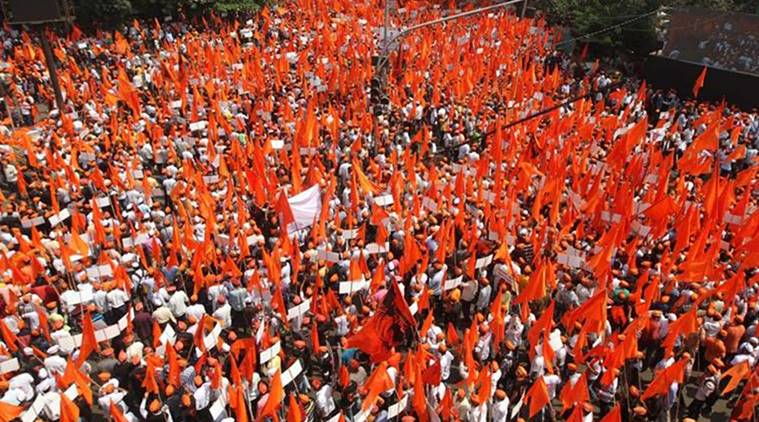 The mook morchas, or silent marches, held across the state in 2016 and 2017, were attended by lakhs of Marathas. (Express File Photo)
The mook morchas, or silent marches, held across the state in 2016 and 2017, were attended by lakhs of Marathas. (Express File Photo)
Leaders of the Maratha community have warned that they will be forced to relaunch their agitation — more aggressively this time — if the central government refused to accept the Supreme Court’s decision to dilute stringent provisions under the Scheduled Caste and Scheduled Tribe (Prevention of Atrocities) Act, and went for a review. The Congress, as well as Dalit leaders in the NDA, have stressed the need for a review petition against the Supreme Court ruling. “… We welcome the ruling, but if the government goes for a review petition before the Supreme Court, we will have to hit the streets again, and this time more aggressively,” said Shantaram Kunjir, state coordinator of the Maratha Kranti Morcha.
The Morcha had undertaken 36 mook morchas, or silent marches, in Maharashtra in 2016 and 2017 over several demands, including watering down of stringent provisions, like denial of bail for those charged under the Act. The morchas were attended by lakhs of Marathas. Kunjir said the ruling, from the highest court of the land, should be accepted by everyone. “We had never demanded that the Atrocities Act be repealed. We have only been demanding that a proper investigation should be conducted before an FIR is registered and there should be a provision for bail,” he said.
Kunjir said if the Congress or other political parties, and leaders “with an eye on Dalit votes, wanted to antagonise the Maratha community, they could do so at their own risk.”
“The Maratha community forms 32 per cent of the total population of Maharashtra. The Congress has been ousted from power because of the caste politics it played. If it again resorts to the same technique, the Maratha community will give it a befitting reply,” he said.
Pravin Gaikwad, another key leader of the Maratha Kranti Morcha, said the Act, in its current form, had “wrecked the lives of several individuals as false cases were imposed on them”. “For instance, if a government employee was charged under the Atrocities Act, he was arrested and denied bail for three or six months. Once a government employee is charged with a crime, even if he is acquitted later, his life is as good as ruined. From his promotion to bank loan, everything is affected,” he said. Gaikwad said the conviction rate under the Act was low, which, he claimed, reflected that “false cases were falling apart”. “Filing of false cases has become the order of the day. Some to blackmail, some to avenge a quarrel,” he said.
He said if the government decided to file a review petition, “one of the options before us is to fight it out in court…”. “The political parties should not focus on justice for only one group, to secure votes. They should seek justice for all communities, only then will they rise in the eyes of the voters and citizens,” said Gaikwad. He said it was a fact that injustice had been committed against SC/ST community members, which necessitated such an Act. “But the Act has been gravely misused, as has been expounded by the Supreme Court. We have never demanded that the Act be repealed. We have only demanded that a proper investigation should be conducted before a person is charged under the Act. Also, he or she should have the right to bail, which is not the case currently,” he said.
Rajendra Kondare, general secretary of the Akhil Bharatiya Maratha Mahasangh, said, “It seems that we will have to gear up for another battle. If the government seeks a review of the Supreme Court ruling, we will also fight it out in the court. But a decision on this will be taken at a meeting on Sunday”.